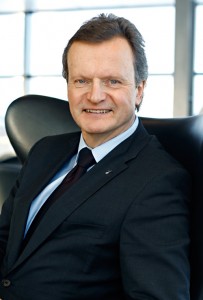
Telenor CEO Jon Fredrik Baksaas
According to a new study commissioned by Norway-based telecom company Telenor and produced by The Boston Consulting Group, there are currently about 500 mobile health projects underway across the globe. Based on their study of mobile health in 12 different countries, including the US, Norway, Thailand, and India, the companies released a number of metrics across a range of mobile health opportunities. Here are a few we found worthwhile:
Mobile health can help reduce costs of elderly care by 25 percent.
Mobile health can reduce maternal and perinatal mortality by 30 percent.
Mobile health enables twice as many rural patients to be reached per physician.
Mobile health can improve Tuberculosis treatment compliance by between 30 percent and 70 percent.
About 30 percent of smartphone users are likely to use "wellness apps" by 2015.
Mobile health can reduce costs related to data collection by about 24 percent.
"Mobile health is already a reality, with hundreds of projects launched worldwide. However, many projects are struggling with achieving scale. Both regulatory actions and ecosystem collaboration is required to create the necessary scale. We need to commit to common standards, increase access to mobile services and document the impact of mobile health. Finally, Governments can use their procurement processes to drive further innovation in mobile health services," says Jon Fredrik Baksaas, President and CEO, Telenor Group.
More metrics in the press release below:
PRESS RELEASE: Barcelona / Oslo - February 28, 2012) Based on the explosive growth in global mobile phone penetration, a technology revolution is quickly gaining pace in healthcare. Around the world, healthcare systems are overburdened, costly and incapable of meeting the needs of a growing population. According to a new study from The Boston Consulting Group and Telenor Group, mobile health technology can offer sizeable benefits to all countries, lead to economic growth and promise a better life for individuals.
Among the key findings:
The necessary infrastructure is already in everyone's hands: 7.4 billion mobile subscriptions projected by 2015
The technology richness and network capacity is sufficient, both on simple feature phones and on smart devices
Currently, more than 500 mobile health projects are taking place around the world
Costs in elderly care can be reduced by 25% with mobile healthcare
Maternal and perinatal mortality can be reduced by 30%
Twice as many rural patients can be reached per doctor
Tuberculosis treatment compliance can be improved by 30-70%
30% of smartphone users are likely to use "wellness apps" by 2015
Costs related to data collection can be reduced by 24%
Smartphone is the most popular technology among doctors since the stethoscope
The study "Socio-Economic Impact of mHealth " - commissioned by Telenor Group and carried out by The Boston Consulting Group - is a comprehensive survey of the impact that mHealth initiatives can have in 12 countries. The countries are grouped into three clusters, each with a different set of primary healthcare challenges. Where countries in one cluster primarily face challenges with non-communicable diseases and quickly growing system costs, countries in another cluster struggle with maternal/child health, communicable diseases and limited access to health care. What unites them all is that mobile health technology can improve the quality, reach and effectiveness of services while reducing costs and the overall system burden.
Telenor Group has launched a number of mobile health initiatives across its markets. In Norway, an assisted living project helps the elderly stay longer at home through mobile alarm systems. In Thailand, a mobile text messaging service provides epidemic surveillance. In Bangladesh and Pakistan, a service called Healthline provides patients with a simple number to dial for both serious and non-serious medical needs. In India, mothers can obtain critical information about prenatal health via their phones. In Montenegro, a joint project with the EU provides a service for remotely located elderly people, enabled by one touch on a button on their mobile handset. In Serbia, mobile health technology is used to increase the quality of medical registration and reporting for the Roma community.
Action is needed
"Mobile health is already a reality, with hundreds of projects launched worldwide. However, many projects are struggling with achieving scale. Both regulatory actions and ecosystem collaboration is required to create the necessary scale. We need to commit to common standards, increase access to mobile services and document the impact of mobile health. Finally, Governments can use their procurement processes to drive further innovation in mobile health services," says Jon Fredrik Baksaas, President and CEO, Telenor Group.
"The technological development and successful pilots around the world demonstrate that the time for mHealth has come. Accelerating adoption will require orchestrating multiple stakeholders, including the alignment of incentives for healthcare professionals to adopt mHealth," says Knut Haanæs, Global Leader, Sustainability Practice, The Boston Consulting Group.
About the study
The study identifies the main healthcare challenges in each study country, and estimates the potential benefits over the next decade of large-scale mHealth solutions being made available, leveraging the best evidence available on mHealth pilots to date. It also examines the roles stakeholders need to play to help make this a reality.














